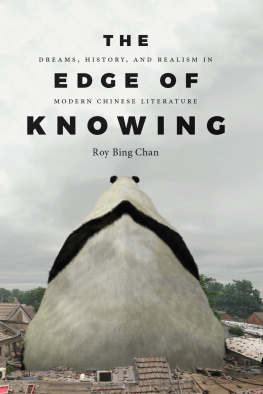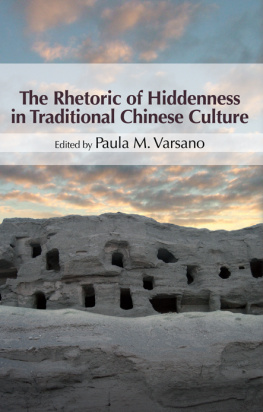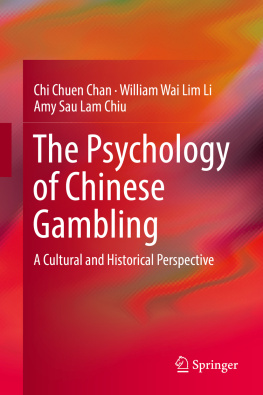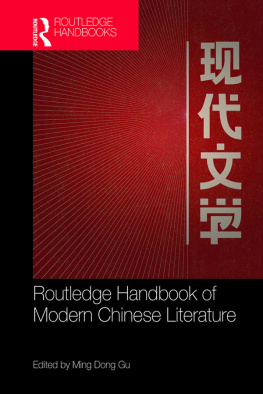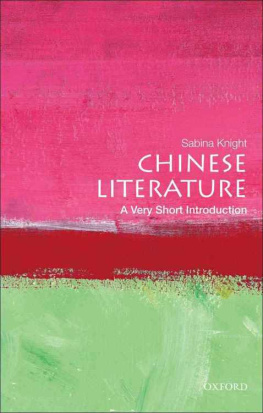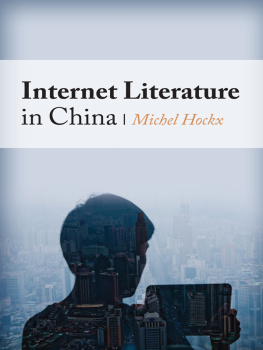
The Edge of Knowing
The Edge of Knowing
DREAMS, HISTORY, AND REALISM IN MODERN CHINESE LITERATURE
Roy Bing Chan
A Robert B. Heilman Book
UNIVERSITY OF WASHINGTON PRESS Seattle and London

THIS BOOK IS MADE POSSIBLE BY A COLLABORATIVE GRANT FROM THE ANDREW W. MELLON FOUNDATION.
The Edge of Knowing is published with support from a generous bequest established by Robert B. Heilman, distinguished scholar and chair of the University of Washington English Department from 1948 to 1971. The Heilman Book Fund assists in the publication of books in the humanities.
2017 by the University of Washington Press
Printed and bound in the United States of America
21 20 19 18 17 5 4 3 2 1
All rights reserved. No part of this publication may be reproduced or transmitted in any form or by any means, electronic or mechanical, including photocopy, recording, or any information storage or retrieval system, without permission in writing from the publisher.
University of Washington Press
www.washington.edu/uwpress
Cataloging information is on file with the Library of Congress.
ISBN 978-0-295-99899-2
The paper used in this publication is acid-free and meets the minimum requirements of American National Standard for Information SciencesPermanence of Paper for Printed Library Materials, ANSI Z39.481984.
For my mother, the bravest dreamer
I have ever known
CONTENTS
ACKNOWLEDGMENTS
I thank Andrew F. Jones, my mentor, whose generous care and devotion sustained me, especially during moments of doubt. It is a debt I have no chance of ever repaying. In addition, I express deep gratitude to Irina Aronovna Paperno and Barbara Spackman for their formative intellectual influence. Irina Aronovna taught me almost all I know about what to do with literature. Barbara expanded my theoretical horizons and consistently championed me. Theodore Huters generously mentored me, and I consider myself lucky to be his student although I never took a class from him. Eric Naiman and William Schaefer also offered great support and advice throughout the years. Willis Konick, Galya Diment, Gordana Crnkovic, James West, Henry Staten, and Nikolai Popov inspired me to pursue the study of literature at the University of Washington. Any remaining errors in the book are mine.
I thank my editor, Lorri Hagman, of the University of Washington Press for providing this manuscript a welcoming home, for providing salient critique, and for pushing me to produce a better, much improved manuscript. The Modern Language Initiative, funded by the Andrew W. Mellon Foundation and established by the late Helen Tartar, provided key subvention support. The University of Oregon Underrepresented Minority Recruitment Program also provided support. I thank these programs for making publication possible.
Material from has appeared as articles: Dreaming as Representation: Wild Grass and Realisms Responsibility, Journal of Modern Literature in Chinese 11, no. 2 (Spring 2014): 1338; Occupied Dream: Politico-Affective Space and the Collective in Zong Pus Fiction, Modern Chinese Literature and Culture 25, no. 2 (Fall 2013): 2150. I thank the editors of these journals for their gracious cooperation.
The Institution of International Education Fulbright Award and Harvard University Fairbank Center for Chinese Studies An Wang Postdoctoral Fellowship offered support that allowed me to travel, research, and write this book. Professors Wang Zhongchen, Xie Zhixi, and Wang Hui made study at Tsinghua University possible. The libraries at the University of California, Berkeley, the University of Oregon, Harvard University, Tsinghua University, the Beijing National Library, and Shanghai Library provided indispensable research support.
I thank the various interlocutors who provided such valuable critique of and support for this manuscript. They include Nick Admussen, Tie Xiao, Anup Grewal, Charles Laughlin, Enhua Zhang, Nick Kaldis, Eileen Cheng, Tom Mullaney, Jason McGrath, Haiyan Lee, Kirk Denton, Wendy Larson, Bryna Goodman, Richard King, and Ying Qian. Thank you all for your inspiration.
Countless friends at UC Berkeley, the College of William and Mary, and the University of Oregon offered fellowship in the original sense of the term. They include Andrew Leong, Anastasia Kayiatos, Amanda Buster, Evelyn Shih, Albert Wu, Juan Caballero, Michael Cronin, Nicholas Medevielle, Arthur Knight, Anita Angelone, Sergio Ferrarese, Jorge Terukina, Mark Quigley, Mayra Bottaro, Jenifer Presto, Katya Hokanson, and Susanna Lim, as well as my current colleagues in the Department of East Asian Languages and Literatures. Special thanks are due to Maram Epstein, who successfully applied for an Underrepresented Minority Recruitment Program fellowship on my behalf.
My best friend, Susan Kas, offered unstinting support in a friendship that has now lasted over fifteen years. I feel lucky to be a part of her family (including Josh, Jennie, Drew, Evee, Sylvia, and now Jonah). I look forward to running countless marathons together. As the marathon of writing this book approached the end, Cameron Mulders warm companionship inspired me to cross the finish line.
I am tremendously grateful for my family, who supported me as I dared to wade into academic life. Without their unconditional support, a working-class kid like me would not have lasted long in the ivory tower. My brothers Ron and Rick have been stalwart champions. My parents, Bing-man Chan and Choi-yuk Tam Chan, who immigrated to this country with little education and spent all their lives as manual laborers, demonstrated the value of love, acceptance, and sacrifice. My mother, in particular, taught me that everyone deserves an equal shot at a decent life. We continue to recount our dreams to each other, sometimes strange, sometimes sad, oftentimes silly. My parents dreamed the best for all of us, and I can only hope that what I have done so far goes some way toward fulfilling their wishes.
The Edge of Knowing
Introduction
In the novel The New Story of the Stone (Xin shitou ji, 1905), Wu Jianrens (18661910) science-fiction sequel to the renowned eighteenth-century classic Dream of the Red Chamber (Hong lou meng; also known as The Story of the Stone [Shitou ji]), the protagonist Jia Baoyu, after a vague period of self-imposed exile, suddenly finds himself in contemporary twentieth-century China. In a dilapidated temple he reunites with his valet, Beiming, who has been searching for his master ever since the first novel concluded. Recounting his arduous search to find Baoyu, Beiming describes entering a mysterious and enchanted temple, where he encounters a group of Daoists. They invite him to stay the night and he consents, only to wake up suddenly reunited with Baoyu in the rundown temple. As Beiming notes, I didnt know that once I fell asleep I would sleep right into this time, and right into this place. I am truly at a loss.
Other late Qing novels also feature emphasis on sleeping and dreaming as ways of figuring modernitys trauma. In the beginning of Liu Es (18571909) The Travels of Lao Can (Lao Can youji, 19035),
In these novels we can see how Chinese writers in the early twentieth century were framing the challenge, and even trauma, of modernity in terms of an abrupt awakening from a dream. Not only did the somatic transition from sleep to awakening suggest how global capitalist modernity was to be framed in terms of alertness; the past itself was now suddenly understood to have been a dreamy enchantment. The trope of sleeping and awakening also captured the profound sense of disorientation, even dizziness, that people emerging from a deep sleep have often experienced. How did we suddenly wake up in this time and in this place? How can we understand the reality of our present when still under the foggy spell of our dreams? Chinese writers have figuratively understood modernity not simply under the familiar terms of progress and rejuvenation but also enmeshed within a more visceral web of figures: sleeping, awakening, hallucination, and, most important, dreaming.
Next page
